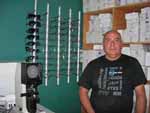Jesús Barragán has been an equipment technician at the University Hospital Virgen Macarena of Seville for years, work that he combines with volunteer work at Eyes of the world. The role of the electromedicine technician, although at first it may seem to be in the background, is absolutely essential for the rest of the Foundation’s healthcare professionals to be able to restore vision to people in the poorest countries. He stands out as well for his role in training local staff. Barragán is very involved with the Foundation and its projects, demonstrated by his multiple visits to the Sahrawi camps and his collaboration with the Eyes of Mali programme. We are doing the interview just after a trip to the African country and a few days before he leaves to the camps.
What role does an equipment technician play in Eyes of the world?
In the beginning, the same as in a hospital: performing checkups, repairs and assembly of medical equipment, in this case the specifics of the specialty of ophthalmology, although optics equipment is also included. There is also an important training role.
Do the technicians in the territories where projects are carried out need much training?
Training is always essential in any place. I know the projects of the Sahara and Mali and, for example, in Mali I got in touch with a technician and I could see that they had an important need for training, not only at a technical level but also organizational, the management of equipment, etc. In these territories the proper use and maintenance of the equipment is essential, because of their scarcity and the difficulties in repairing them. That is why the training of Eyes of the world is of great importance to me.
You just returned from Mali, how did the training go in the IOTA?
The experience has been short but intense. As I was saying before, the need for training is very large, but not only the transfer of knowledge but also giving tools, materials or equipment manuals. Without this, it is very difficult to organize a maintenance system. But in Mali the people are exceptional and they have made a lot of things easier for me. I think that it is a good start and I hope it will continue.
You had not traveled to the African country since 2009, what changes have you noticed at the level of optical and ophthalmological care?
Unfortunately, for security reasons I was not able to visit the region of Mopti to see the optician and the operating room of the Bankass hospital built by Eyes of the world. This time I stayed in Bamako and this allowed me to get to know the IOTA. The quantity and quality of the ophthalmological care surprised me, but I was overwhelmed by the extent of the territory it serves. It is for all the countries around Mali!
In April you are going to the Sahrawi camps. What work will you do?
The plan is to review the equipment of the different doctors and opticians. I will also start the installation of an optician’s in the wilaya of El Aaiun.
What does collaborating with the Foundation bring to you, on a personal level?
For me it is a great satisfaction to be able to collaborate so that the human right to health can be guaranteed, in this case ocular health. This and the people that you know brings you great personal enrichment. During the first trips to the Sahara I was impressed by the dignity with which the Saharawi town maintained a national structure in a territory that is hardly compatible with life. Now in Mali I am impressed by the level of existing poverty, which also makes me angry. It will take something more than humanitarian aid for countries like Mali to get out of this situation.
